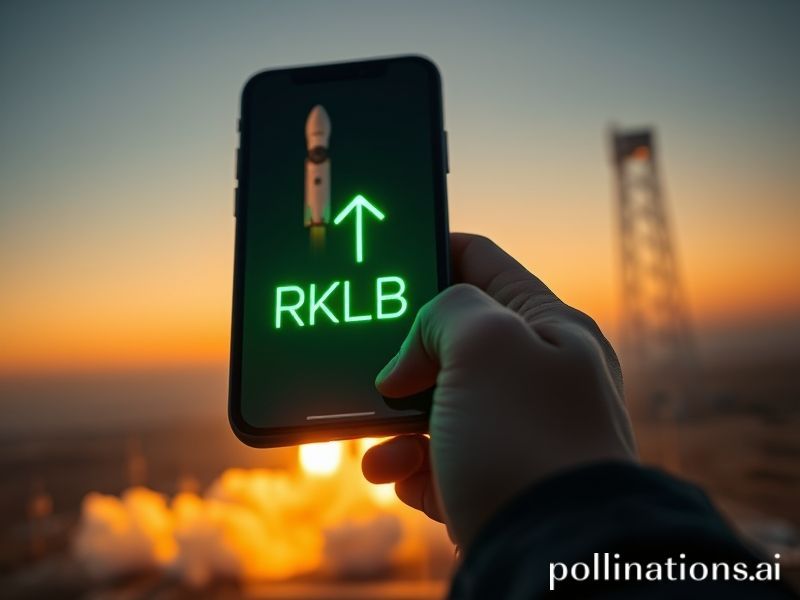RKLB Stock: How a Kiwi-Born Rocket Firm Became the World’s Orbital Casino Chip
Rockets, Roulette, and the Global Cult of RKLB: How a New Zealand-Born, California-Listed Launch Firm Became the World’s Favorite Orbital Casino
By the time the bell rings in New York, half the planet is already staring at a ticker symbol that sounds like a sneeze: RKLB. Rocket Lab USA—born in Auckland, headquartered in Long Beach, launched from a sheep-dotted peninsula at the bottom of the world—now trades on Nasdaq like any other purveyor of dreams and quarterly guidance. The irony is exquisite: a company whose core business is escaping Earth’s gravity is, for investors, utterly bound to its gravity well of quarterly numbers and macro tantrums.
Consider the optics from six continents. In Tokyo, a retail trader in a $400-a-month Shibuya shoebox checks his phone at 3 a.m. local time because Wall Street is still open and RKLB just announced a 14% quarterly revenue beat. In Frankfurt, an ESG analyst with a PhD in moral philosophy mutters darkly about “space debris externalities” while quietly adding shares for the pension fund. Down in Sydney, a 19-year-old on a gap year buys three shares via an app named after an endangered marsupial, convinced that launching satellites is the moral equivalent of planting trees—if trees orbited at 550 km and carried advertising payloads for insurance companies.
None of this is irrational; it’s merely the globalization of hope, wrapped in the language of risk-adjusted return. Rocket Lab’s Electron rocket is now the Toyota Corolla of small-lift launch—reliable, mass-produced, and somehow everywhere at once. Their bigger Neutron, still a CAD file with delusions of grandeur, is being pitched as the SpaceX Falcon 9’s polite understudy. The market, ever the drama critic, can’t decide whether to applaud or demand an encore before the curtain rises.
Meanwhile, the geopolitical subplot thickens. The Pentagon needs someone—anyone—who isn’t Elon Musk to launch its spy cubesats, lest a single billionaire become the de facto air-traffic controller of low-Earth orbit. Enter RKLB, waving an American flag stitched in Southern California and politely forgetting its Kiwi midwifing. The U.S. State Department, in its infinite wisdom, has classified satellite launch technology as a munition, which means every Electron firing from Mahia Peninsula is technically a diplomatic incident waiting to happen. One rogue tweet from a sheep farmer about “American rockets on Māori land” and the commentariat will discover colonialism all over again.
Then there’s China, whose own state media alternates between deriding private space ventures as “speculative casino capitalism” and quietly funding copycat startups that may or may not be fronts for the PLA. Watching Beijing try to square Marxist orthodoxy with reusable boosters is like watching a panda attempt ballet: awkward, occasionally endearing, and potentially lethal if it falls on you.
Europe, bless its regulatory heart, worries about carbon footprints, sustainable launch cadences, and the moral hazard of putting yet more redundant IoT toasters in orbit. Brussels would like RKLB to file an environmental impact statement for every kilogram of payload, preferably in triplicate and translated into Maltese. Rocket Lab’s response, delivered with Antipodean cheer, is to promise carbon-neutral launches by 2030—achieved, presumably, by planting an entire continent of eucalyptus and hoping the koalas don’t unionize.
All of which sends RKLB stock on a joyride that makes orbital mechanics look quaint. One week it surges on rumors of a classified U.S. Space Force contract; the next it dives because an Electron second stage hiccups and showers the Pacific with yet another confetti of lithium-ion batteries. The market, like humanity itself, wants infinite expansion without the messiness of entropy. Good luck with that.
So what does RKLB actually signify in the grand, tragicomedy of late-stage capitalism? Simply this: we have turned the final frontier into a leveraged ETF. Every launch is a quarterly report with plumes of fire; every satellite deployment, a shareholder update in 90-minute polar orbit. Somewhere, Konstantin Tsiolkovsky is updating his rocket equation to include “sentiment analysis” and “retail FOMO.”
And yet, amid the cynicism, there’s a flicker of something almost noble. A species that can simultaneously doom-scroll climate headlines and bid up a launch provider’s shares is, if nothing else, multitasking on a cosmic scale. The bet investors make is that somewhere between the spreadsheets and the stratosphere, we might just earn the right to keep looking up.
Until then, may your stop-losses be tight and your apogees higher than your expectations.







